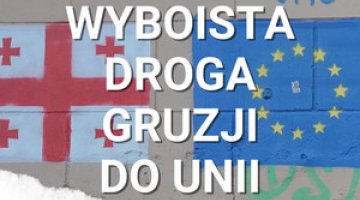Georgia: elections in the shadow of Saakashvili's return
Local elections were held in Georgia on 2 October. According to unofficial nationwide results, they were won by the ruling Georgian Dream/Democratic Georgia (GD) party, which obtained 46.7% of the votes. The United National Movement (UNM) associated with former president Mikheil Saakashvili came second with 30.7%, and the For Georgia group, founded this year by the former prime minister and longtime GD politician Giorgi Gakharia, came third with 7.8%. The turnout was 51.9%. A runoff vote will be necessary in 20 cities, including Tbilisi, as none of the mayoral candidates won over 50% of the vote there (direct elections for the mayor are held in 64 local government units); this is scheduled for 30 October. The results are consistent with pre-election polls and estimates from local NGOs. According to the preliminary assessment of the ODIHR/OSCE mission, the voting was transparent and went off peacefully; so far, there have been no post-election protests.
On the eve of the election, on 1 October, Saakashvili, who had been in exile since 2013, announced his return to his native country; he was arrested towards the end of that same day. Previously, the authorities denied that he was in Georgia. The former president is the subject of two court sentences, totalling several years’ imprisonment, and two further cases against him are still pending. He will also be charged with illegally crossing the state border.
Commentary
- The elections were held in the midst of a very serious domestic political crisis and a growing conflict in Tbilisi’s relations with the EU and the US. After the parliamentary elections in autumn 2020, which the opposition believes were conducted unfairly, Brussels joined the mediation process between the main political forces. In April this year, under the aegis of the President of the European Council Charles Michel, GD concluded an agreement with some of the opposition which stated that if the party won less than 43% of the vote in local elections, early national elections would be called. Thanks to these arrangements, deputies from opposition groups took their seats in parliament, after previously refusing to accept them. In July this year, however, GD withdrew from this agreement, which Tbilisi’s western partners had strongly criticised (it was signed by the UNN in September). Nevertheless, for the opposition, a weaker result from GD would constitute grounds for undermining the legitimacy of its rule. In this situation, the local elections became a kind of popularity poll of the individual parties, and their importance went beyond the question of power in local governments. The internal polarisation has not yet translated into public readiness to participate in rallies and street demonstrations, but such activity may occur after the second round and the announcement of the final results.
- The results of the first round confirmed GD’s dominance of the Georgian political scene. Since autumn 2012 the party has won every election held, and the country’s president is a politician whom it supports. Voters associate GD’s rule with relative stability and predictability, especially against the background of the rule of the UNM and Saakashvili. It is of great political importance that GD obtained over 43% of votes, thus exceeding the threshold set in the agreement back in April this year. Nevertheless, the relatively good result of the For Georgia formation is a proof of a certain fatigue with Georgian Dream. On the one hand, Gakharia has dissociated himself from the ruling party, while on the other he remains associated with the broad political establishment. It cannot be ruled out that GD's strings are still being pulled by its original creator and behind-the-scenes leader Bidzina Ivanishvili, who may have wanted to create For Georgia as an alternative for voters disillusioned with GD, but are also distrustful of the traditional opposition. The need to hold a runoff vote in the largest cities, including Tbilisi, has hurt GD’s prestige. The party had hoped to gain an advantage from the so-called administrative factor, i.e. the support from the state administration and government jobs; the number of officials being appointed by GD, including at the lowest levels, is constantly growing. The elections should not change the course of Georgia’s foreign policy. It will remain pro-Western, although with a strong emphasis on the country’s autonomy and independence; this will deepen Georgia’s conflicts with Brussels and Washington (for reasons including the delays to planned reforms, the authorities’ muted reactions to demands from LGBT circles, etc.), but it well reflects the mood of a society attached to conservative values.
- The UNM confirmed that it remains the main opposition force. It should be assumed that its result – which was high compared to the recent elections and the ratings of other opposition parties – is due to the strong social polarisation (local issues occupied little space in the campaign, which revolved around the dispute between the government and the opposition) and the ‘Saakashvili factor’. The former president evokes extremely negative emotions in some of the electorate, but for others he is still the embodiment of Georgia’s successes, and his return to the country could have prompted them to vote for the UNM. The party’s great achievement in this round of elections is that its mayoral candidates won in the first round in four major cities (Batumi, Kutaisi, Rustavi and Zugdidi) and reached the second round in Poti and Tbilisi. In addition, the opposition gained a majority on the Batumi and Zugdidi city councils. The UNM’s immediate goal is to persuade other opposition formations to support its candidates in the next stage of voting, and in the longer term to find a formula to keep operating as the opposition and ‘managing’ Saakashvili. Whether the UNM decides to initiate protests after the second round of elections will depend on how they turn out.
- Saakashvili’s arrival has mobilised the UNM’s hard-core electorate. It should be assumed that demands for his release will become an important item on the Movement’s agenda, although the arrest itself has not so far led to any major protests. In the future, however, conflicts may arise between the former president and the UNM’s current leadership over the leadership of this group and the opposition camp as a whole. For the government, the arrival of Saakashvili (currently being detained in Rustavi) gives them an image problem. There are many indications that he was smuggled into the country in a truck that came by ferry from Ukraine, which proves the leakage of Georgia’s borders and casts the border services in a bad light. At the same time, however, the presence in the country of a politician demonised in government propaganda (he has been blamed for the unfavourable turn of political relations, including the growing criticism of Georgia from its Western partners), who has clearly broken the law, leaves room to mobilise the GD electorate and make further attacks on the opposition. On 3 October, Prime Minister Irakli Garibashvili said that Saakashvili and his comrades planned to kill opposition activists in order to destabilise the situation in the country and later blame the authorities for the attacks. Since President Salome Zurabishvili has already announced that she will not offer Saakashvili a pardon, it should be assumed that he will spend at least three years in prison – the next parliamentary elections are scheduled for the autumn of 2024. Regardless of the domestic political conditions, the ‘Saakishvili case’ will certainly be watched closely by Georgia’s Western partners, and any manifestations of irregularities in court proceedings may further cool the country’s relations with the wider West.





